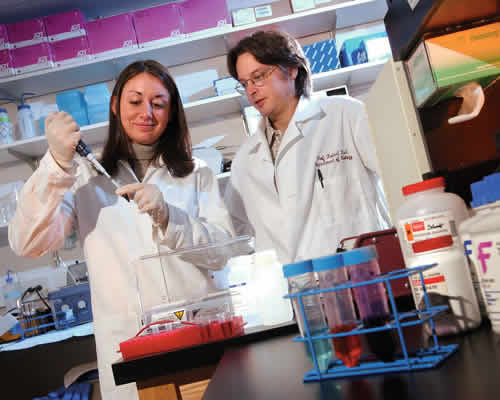Robert Kurt, assistant professor of biology at Lafayette, has received a $214,000 grant from the U.S. Department of Defense to study the immune response to breast cancer. The grant will fund his research and supplies, as well as paying for student assistants to work with him during upcoming summers.
“The grant will provide the means to determine whether we can reverse some of the adverse effects that tumors have on the immune system,” Kurt says.
Kurt is studying the production of chemokines by tumors. Chemokines are a group of proteins that direct cell migration through the body. Kurt is trying to determine how tumors can grow while producing these substances, which theoretically could attract immune cells to the growth. Tumors can produce many different types of chemokines, 50 of which have been identified.
“I am interested in how tumor-derived chemokines adversely affect anti-tumor immunity,” says Kurt. “The long-term goal of this project is to identify ways in which tumors have found to bypass our bodies’ defense against them.” His research in this area has been published in the journals Cancer Gene Therapy and International Journal of Cancer.
Two students are currently working with Kurt on this research, Marisa Bauck of Marlton, N.J., and Sarah Harma of Cheshire, Conn. Both are junior biology majors. They may be invited to work under the auspices of the grant. Two more biology majors are starting research this term, Jeffrey Hurtado, a senior from Delran, N.J., and Evan Adler, a junior from from Ocean, N.J.
“Sarah and Marissa were working to confirm the findings in two additional tumor models, a spontaneous breast cancer and spontaneous prostate cancer model,” says Kurt. “The student researchers for this grant will be responsible for creating and cloning tumor cells that lack chemokines and evaluating the immune response elicited by these tumor cells.
“I have found the students at Lafayette to be hard working, dedicated and eager to take an active role in their education,” he adds. “I believe the background in science and laboratory courses offered at Lafayette makes it easy for students to make the transition from a laboratory course, where experiments are supposed to work as planned, to independent research, which is real life and experiments do not always turn out as planned.”
Kurt also has conducted research in two other areas relating to the immune response to cancer. One covers the body’s “T cell” response.
“T cells are a group of immune cells that patrol the body looking for anything that does not belong,” he explains. “For tumor immunity, they are critical because they have the ability to kill tumor cells without destroying normal tissues. Furthermore, once T cell immunity has been established and the threat to your body has been removed, you are left with immunological memory. This means that if the tumor comes back, your body is already prepared to handle it.”
He is identifying the initial steps in “recruiting” T cells to tumor sites. Kurt’s work in this area has been published in Journal of Immunology, International Immunology, and International Journal of Cancer.
The other aspect of Kurt’s research focuses on tolerance toward self tumor antigens, which are substances that induce immune responses. “For the most part, our immune system ignores tumors because they arise from ‘self’ tissue,” says Kurt. “Regulatory components prevent our immune system from responding against our own bodies in order to prevent the development of autoimmune disease. The long-term goal of this project is to understand the mechanisms of tolerance toward self tumor antigens.” He has published a paper on this subject in Breast Cancer Research and Treatment and has another in the process of being published by International Journal of Cancer.
Kurt joined the Lafayette faculty last fall after two years as a cellular immunology research scientist at Earle A. Chiles Research Institute of the Providence Portland Medical Center, Portland, Ore., and adjunct biology faculty member at University of Portland. Prior to that, he was a teaching assistant at the University of Arizona School of Medicine and a Science Alliance Summer Research Fellow in the department of chemistry at the University of Tennessee.
He holds a doctorate in microbiology/immunology from University of Arizona, Tucson, and a bachelor of science degree from Bowling Green State University. Kurt has received three Sigma Xi travel awards and was honored for Best Presentation at the 1996 Annual Meeting of the Arizona Imaging and Microanalysis Society.

A National Leader in Undergraduate Research. Erin Allison ’03 made a presentation on research she did under the guidance of Robert Kurt, assistant professor of biology, at the annual meeting of the Pennsylvania Academy of Science.
